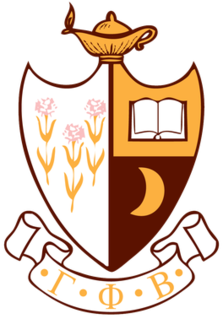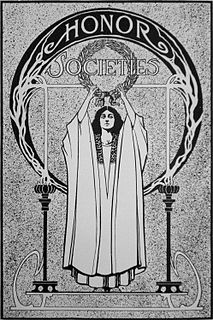Delta Phi Epsilon (ΔΦΕ) may refer to:
- Phi Beta Delta (fraternity), the social fraternity that was founded in 1912 and merged with Pi Lambda Phi in 1941
- Phi Beta Delta (honor society), the international honor society that was founded in 1986
Delta Phi Epsilon (ΔΦΕ) may refer to:

The Phi Beta Kappa Society (ΦΒΚ) is the oldest academic honor society in the United States, and is often described as its most prestigious one, due to its long history and academic selectivity. Phi Beta Kappa aims to promote and advocate excellence in the liberal arts and sciences, and to induct the most outstanding students of arts and sciences at American colleges and universities. It was founded at the College of William and Mary on December 5, 1776, as the first collegiate Greek-letter fraternity and was among the earliest collegiate fraternal societies.

Dartmouth College is host to many Greek organizations, and a significant percentage of the undergraduate student body is active in Greek life. In 2005, the school stated that 1,785 students were members of a fraternity, sorority, or coeducational Greek house, comprising about 43 percent of all students, or about 60 percent of the eligible student body. Greek organizations at Dartmouth provide both social and residential opportunities for students, and are the only single-sex residential option on campus. Greek organizations at Dartmouth do not provide dining options, as regular meals service has been banned in Greek houses since 1909.

Gamma Phi Beta is an international college sorority. It was founded in Syracuse University in 1874, and was the first of the Greek organizations to call itself a sorority. The term "sorority" was coined for Gamma Phi Beta by Dr. Frank Smalley, a professor at Syracuse University.

In the United States, an honor society is a rank organization that recognizes excellence among peers. Numerous societies recognize various fields and circumstances. The Order of the Arrow, for example, is the National Honor Society of the Boy Scouts of America. Chiefly, the term refers to scholastic honor societies, those that recognize students who excel academically or as leaders among their peers, often within a specific academic discipline.
The Association of College Honor Societies (ACHS) is a predominantly American, voluntary association that serves a number of functions with respect to national collegiate and post-graduate honor societies. ACHS coordinates member organizations, facilitates communications between them, and provides both scholarships and an outlet for publication to members. ACHS member societies undergo periodic audits to validate their adherence to ACHS standards and their qualification for membership and ACHS certification.

Phi Delta Chi was founded on 2 November 1883 at the University of Michigan in Ann Arbor, Michigan by eleven men, under the sponsorship of Dean Albert B. Prescott. The fraternity was formed to advance the science of pharmacy and its allied interests, and to foster and promote a fraternal spirit among its brothers, now both male and female.
Professional fraternities, in the North American fraternity system, are organizations whose primary purpose is to promote the interests of a particular profession and whose membership is restricted to students in that particular field of professional education or study. This may be contrasted with service fraternities and sororities, whose primary purpose is community service, and social fraternities and sororities, whose primary purposes are generally aimed towards some other aspect, such as the development of character, friendship, leadership, or literary ability.
The Mother of Fraternities refers to two colleges: Union College and Miami University, both of which founded many fraternities.
Phi Alpha may refer to:
East Carolina University is home to sixteen social fraternities, ten social sororities, five historically African-American fraternities, and four historically African-American sororities. There are also sixteen honor fraternities, and twelve service or religious fraternities/sororities.

The Professional Fraternity Association (PFA) is an association of national, collegiate, professional fraternities and sororities that was formed in 1978. Since PFA groups are discipline-specific, members join while pursuing graduate degrees as well as undergraduate degrees. PFA groups seek to develop their members professionally in addition to the social development commonly associated with general fraternities. Membership requirements of the PFA are broad enough to include groups that do not recruit new members from a single professional discipline. The PFA has welcomed service and honor fraternities as members; however, Greek letter honor societies more commonly belong to the Association of College Honor Societies.
The North American fraternity and sorority system began with students who wanted to meet secretly, usually for discussions and debates not thought appropriate by the faculty of their schools. Today they are used as social, professional, and honorary groups that promote varied combinations of community service, leadership, and academic achievement.
The College of William & Mary fraternity and sorority system recognizes chapters of national organizations belonging to the Panhellenic Council, the Interfraternity Council (IFC) and the National Pan-Hellenic Council, and also recognizes one local fraternity without Greek letters and the local chapter of one national fraternity that abandoned membership in an inter-Greek consortium. The school also offers a variety of honor and co-ed service fraternities as well. The first collegiate fraternity within the present borders of the United States, the Latin-letter F.H.C. Society, was founded at the College of William & Mary on November 11, 1750. The new country's first Greek-letter fraternity was founded at the College on December 5, 1776, though the Phi Beta Kappa Society no longer is a social fraternity but, instead, the leading American academic honor society. Some fraternities and sororities are limited to graduate students at William & Mary, while others may only be joined at the undergraduate level. Still other Greek-letter organizations operate without recognition or approval from college administrators.

Fraternities and sororities at University of Virginia, include the collegiate organizations on the grounds of the University of Virginia in Charlottesville, Virginia. First founded in the 1850s with the establishment of a number of fraternities, the system has since expanded to include sororities, professional organizations, service fraternities, honor fraternities, and cultural organizations. Fraternities and sororities have been significant to the history of the University of Virginia, including the founding of two national fraternities Kappa Sigma (ΚΣ) and Pi Kappa Alpha (ΠΚΑ).
Sigma Delta Rho (ΣΔΡ) was a small national men's fraternity founded on January 8, 1921 at Miami University of Ohio, the fifth general social fraternity to be formed at that school. It "disintegrated" in the spring of 1935 due to pressures of the Great Depression and "absence of strong leadership." About half its chapters were absorbed into other fraternities.